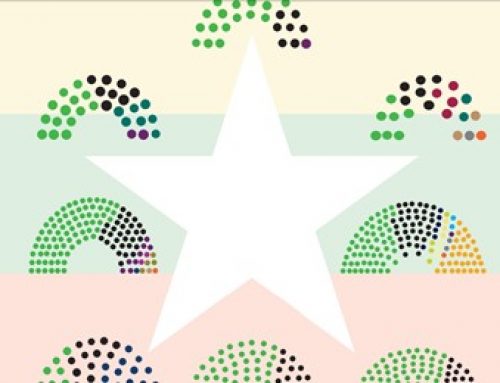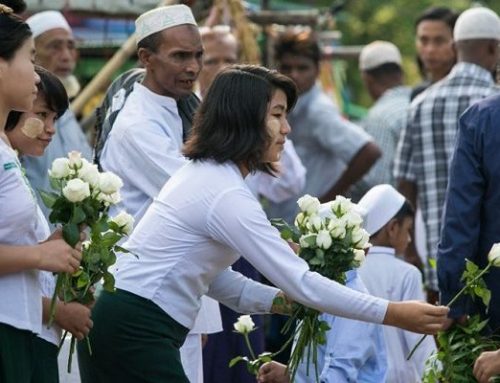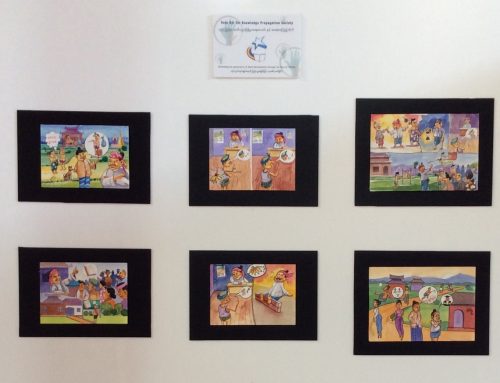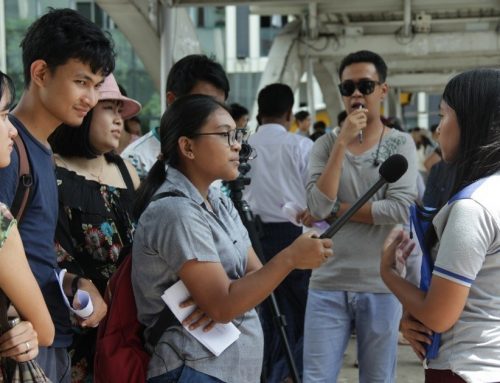Lindsey Merrison
In 2017, the Yangon Film School launched a programme of training, mentorships and outreach around ‘Women and Peace in Myanmar’. As part of this, YFS used a Parliaments4People (P4P) grant to enable Indian gender-activist Paromita Vohra and award-winning animator Debjani Mukherjee to travel to Yangon where they joined with YFS to train a group of young Burmese students in innovative documentary and animation film techniques. Paromita guided the students as they independently researched, identified and interviewed protagonists on location in Kachin, Shan, Kayin and Kayah States in Myanmar. On their return to Yangon the students continued to work with Paromita to transcribe, analyse and edit together key sentences to create four short audio narratives. These documentary testimonials provided the basis of the four short animations that were made during a subsequent six-week course under Debjani’s tutelage.
The aim of the ‘Stand Up for Women! Stand Up for Peace!’ docu-animation film series is to increase understanding of gender-based violence amongst public and policy-making audiences. It challenges the perception of violence against women as a private domestic issue, and situates it instead in the broader social landscape – exploring the intersections and entanglement between gender-based violence on one hand, and conflict, human rights, and precarity on the other. The course participants and subsequent film-makers were encouraged to think about how arts and humanities methodologies such as docu-animation can produce visually powerful narratives in emotionally resonant ways.
“The P4P Grant we received helped us bring the experienced Indian filmmaker and writer, Paromita Vohra, to Myanmar to lead a training workshop that inspired the development of four docu-animations on gender-based violence researched, scripted, filmed, edited, directed, and produced by people in Myanmar. As a result, we have been able to start conversations with local, regional, national, and international audiences about gender-based violence in areas of Myanmar affected by conflict, and the inclusion of youth and women in Myanmar’s peace process. It demonstrates the power and effectiveness of art as a tool for change, which research alone can’t produce. The recent WHO Grand Prix award for one of these docu-animations provides further evidence of the ability of film to engage audiences across the globe” says Lindsey Merrison, project PI and founder of YFS.
The docu-animations continue to be screened worldwide, including at the United Nations Population Fund youth media summit and Women’s Day; 17th Bogo Shorts International Short Film Festival (Colombia); Harkat Studio and Tribal Animation Film Festival (India); 14th Sardinia Film Festival (Italy); 17th Hiroshima International Animation Film Festival (Japan); Travelling Cinema Screenings in Chin State and the delta, the French Institut Yangon, and the Ahnu Thutaythana Festival (Myanmar); Non Stop Barcelona Animation Film Festival (Spain); Animatou International Animation Film Festival, Anne-Marie Schindler Foundation (Switzerland); Factual Animation Film Festival and British Film Institute, Watersprite Film Festival (UK); KIN Women’s International Film Festival, Yerevan, Armenia.
On 14 May 2020 Limbo won the Grand Prix Award during the inaugural Health for All Film Festival organised by the World Health Organisation (WHO) in Geneva. There were a total of almost 1,300 submissions for five categories. The jury comprised the director of the famous Annecy Animation Film Festival and the Director-General of WHO, Dr Tedros Adhanom Ghebreyesus. The award is accompanied by a grant of 10,000 USD, and you can expect to see Limbo screened on WHO online platforms and channels, as well as at various WHO events around the world (post-covid).
HOME, 5’
A woman living with her family in a camp for internally displaced people in Kachin State recalls how war drove her from her village and asks if her dream of returning to her peaceful existence at home will ever come true.
KAYAH LILY, 5’36”
A thirteen-year-old rape survivor describes the day she was attacked in the woods and how, with support from her family and teachers, she has succeeded in making a new life for herself in spite of her traumatic experience.
WAVE, 5’46”
An independent female humanitarian activist from Shan State describes the trauma she experiences in working in an environment pervaded by despair but also her commitment to helping those forced to flee armed conflict.
LIMBO, 5’
Tells the powerful story of a 19-year-old woman who is raped at home in Kayin State by her uncle. Initially pressured by her aunt and uncle to remain silent and abort the child that resulted from the attack, she is now determined to obtain justice in order to bring up her young son in an equal society.
About Yangon Film School
The award-winning Yangon Film School (YFS) is Myanmar’s only film school. Since its inception in 2005 the School has – in spite of numerous constraints – managed to transfer solid skills free of charge to over 235 talented young people from 14 different ethnicities and all walks of life in Myanmar. In the past fifteen years, YFS has produced almost 280 short films and documentaries. Filmed throughout Myanmar by multi-ethnic crews, these works reflect the complexity and the richness of life in this diverse yet deeply divided country – now sadly in the throes of violent upheaval and political turmoil following the Myanmar military’s sudden seizure of power on 1 February 2021.
About Paromita Vohra
Award-winning filmmaker and writer whose work has focused on gender, desire, urban life and popular culture. She is noted for being among filmmakers who opened up new languages of documentary, mixing fiction and fiction to create a uniquely personal playful essay form and for making strong contributions to the feminist discussion in India. In her twenty-five-year career so far, she has worked as director, writer, actor, installation artist, curator and educator and producer, also for her own Mumbai based independent production company Parodevi Pictures. Academic publications include The Politics and Aesthetics of the Indian Documentary (with Arvind Rajagopal, Bioscope) and Dotting the I: The Politics of Self-Less-Ness in the Indian Documentary (The South Asian Journal of Popular Culture). Follow Paromita on Twitter: @parodevi
About Debjani Mukherjee
https://katha.org/blog/2019/05/17/interview-with-debjani-mukherjee/#.Xs1CLmhKg2w
YFS in the news
Profile of YFS by Japanese broadcaster NHK, as part of their series Asia Insight series.




